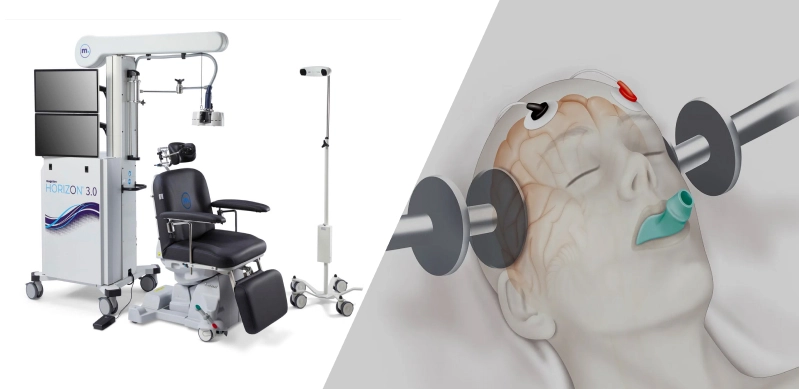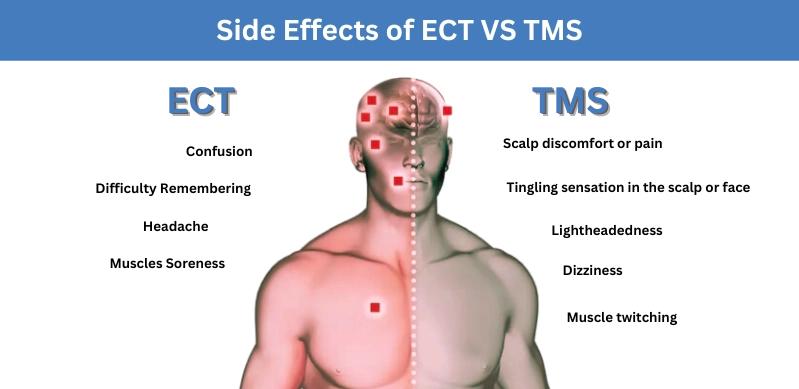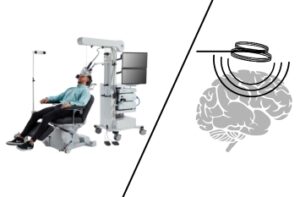Transcranial Magnetic Stimulation (TMS) and Electroconvulsive Therapy (ECT) are both forms of brain stimulation therapy used to treat various mental health conditions. While they share some similarities, there are also key differences between the two treatments. According to the National Institute of Mental Health, TMS is a non-invasive procedure that uses magnetic fields to stimulate nerve cells in the brain, while ECT involves using electric currents to trigger controlled seizures.
In this blog, we will compare and contrast TMS and ECT to help you understand which treatment may be more suitable for your needs.
TMS is not without its potential side effects. Because the procedure involves stimulating the brain, some individuals may experience headaches or mild discomfort at the site of stimulation. These side effects are generally short-lived and can be managed with over-the-counter pain relief medication. Apart from this, experts also suggest that TMS has minimal or no effects on memory when compared to ECT.
However, the following are some of the common side effects associated with TMS:
The FDA has approved TMS for use in adults who have not responded well to traditional antidepressant medications. It may also be recommended for individuals who cannot tolerate the side effects of these medications or those seeking alternative treatment options. There is a growing body of research supporting the use of TMS for other conditions such as PTSD, bipolar disorder, and chronic pain. However, these are currently considered off-label uses, and more studies are needed to confirm their effectiveness.
Following are some of the factors that may make you a good candidate for TMS:
Many people confuse TMS with electroshock therapy, also known as ECT. While both treatments involve stimulating the brain, they use different methods and have varying levels of intensity. Unlike ECT, TMS does not induce seizures or require anesthesia.
Additionally, TMS targets specific areas of the brain rather than the entire brain, like ECT. There is also no evidence to suggest that TMS has the same potential risks and side effects as ECT, such as memory loss or confusion.
ECT was first developed in the 1930s and has been used for treating severe depression, bipolar disorder, and schizophrenia. It involves passing an electric current through the brain, causing a controlled seizure. The exact mechanism of how this treatment works is still not fully understood, but it is believed to alter brain chemistry and improve symptoms.
ECT is typically administered in a hospital setting and requires anesthesia. The procedure only lasts for a few minutes, but several sessions may be necessary to achieve the desired results. ECT may also cause more severe side effects compared to TMS.
ECT is a more invasive and intense form of brain stimulation therapy, so it may cause more severe side effects. Some common side effects associated with ECT include:
ECT is usually recommended for individuals with severe mental health conditions who have not responded well to other treatments. It may also be used when other treatments are not possible due to medical reasons. While it is often portrayed negatively in media, ECT remains an effective treatment option for certain individuals.
TMS or ECT and its differences can be easily misunderstood due to the similar target keywords. However, these treatments have significant differences in terms of procedure, side effects, and eligibility criteria.
To help you understand the differences, we have compiled a comparison table of TMS VS ECT that highlights the key differences between these two treatments:
ECT VS TMS for Depression can be a challenging decision to make, as both treatments have their advantages and limitations. The choice ultimately depends on individual needs, preferences, and eligibility criteria. It is essential to consult with a healthcare professional who can help you make an informed decision about which treatment may be more suitable for your condition.
Transcranial magnetic stimulation vs electroconvulsive therapy These two treatments are often compared as they both involve stimulating the brain to alleviate symptoms of mental health conditions. However, TMS and ECT have significant differences in terms of procedure, side effects, and eligibility criteria.
However, below are some of the key takeaways from this comparison:
Ultimately, the choice between TMS and ECT will depend on individual circumstances and should be made in consultation with a healthcare professional. If you are considering these treatments, make sure to research thoroughly and consult with a healthcare provider to find the best option for your specific needs.
According to mental health professionals, ECT side effects can range from mild to severe. These may include confusion or disorientation after treatment, memory loss, and physical discomfort. In contrast, TMS therapy has minimal side effects, such as headaches and scalp discomfort. In rare cases, TMS may trigger seizures in individuals with a history of epilepsy or brain injury.
It is important to note that both ECT and TMS have been deemed safe and effective by the FDA, but each individual may respond differently to these treatments. Understanding the differences between ECT and TMS can help you make an informed decision about which treatment may be more suitable for your specific needs. So, consult with a specialist today to find out more about these treatments and if they are right for you.
If you have had ECT in the past, you may wonder if you can still receive TMS therapy. There are no contraindications for receiving TMS after undergoing ECT. In fact, some studies have shown that individuals who did not respond to ECT may benefit from TMS therapy. According to mental health experts, TMS and ECT are not mutually exclusive treatments, and they can be used in combination or separately depending on individual needs.
Furthermore, some individuals may receive both treatments, with TMS being used as a maintenance therapy after ECT. It is crucial to discuss your treatment options with a healthcare professional to determine the best course of action for your specific needs.
For more information and guidance related to Mental and Behavioral Health, get in touch with our specialized Adult Mental Health Expert!






